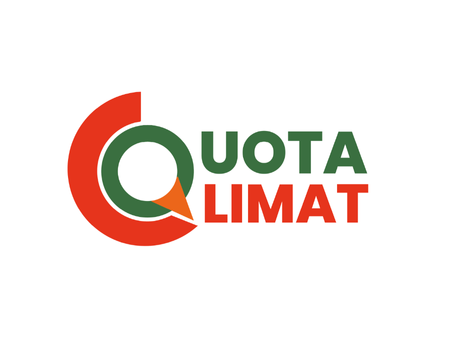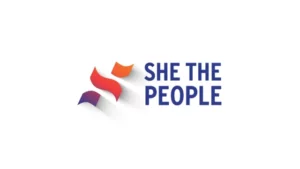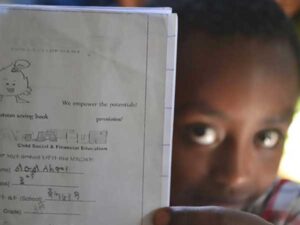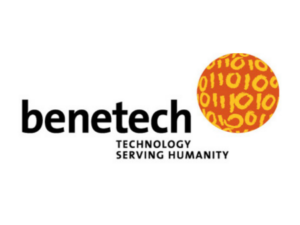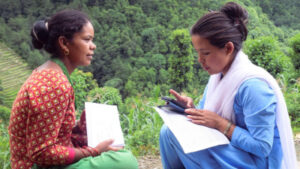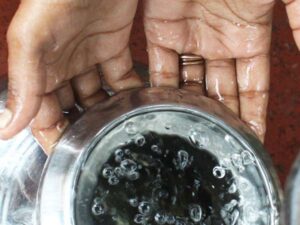Quota Climat works hand-in-hand with citizens, businesses, associations, policymakers, scientists, and journalists to jointly advocate for media coverage that matches the scale of the ecological crisis.
Anissa Saudemont and Eva Morel spoke with Ambika Samarthya-Howard on September 24, 2025. Click here to read the full conversation with insights highlighted.
Ambika Samarthya-Howard: Can you both introduce yourselves and talk a little bit about the organization. How do you identify it? Is it a media organization, or an INGO?
Eva Morel: My name is Eva Morel. I co-founded the NGO, QuotaClimat, in 2022. We are a non-for-profit organization that’s recognized in France with a public interest status. We work to improve the climate media coverage.
We started this organization because my two co-founders and I were working at the French Parliament. We realized the power of media and journalism in putting decision makers in motion. We realized that this role was poorly played, notably in 2022 during the last French presidential election. The total amount of airtime dedicated to environmental information was approximately 3%. That was very low in comparison to other public interest topics.
Ambika Samarthya-Howard: What public interest topics got more coverage?
Eva Morel: Most of them were geopolitical issues, or economics, migration, and social issues. We realized that the lack of environmental coverage was structural and long term, and that journalists didn’t have any incentives to foster this coverage, not only in terms of quantity, but also of quality.
Our first launching proposition was to set a voluntary quota during electoral campaigns on environmental information in the media, and specifically during political interviews. There was a lot of noise surrounding this proposition, so we launched the NGO with three streams of action.
The first is to call out the media and incentivize them to work on specific angles, not only the solutions angle, which is very poorly covered in France and also at EU level. The second is to produce data to provide clarity on our intuition that the coverage was low. We work with other data folks to do that. We work with two organizations to produce the data on disinformation, and many others to produce data on the quantity of airtime. These are mainly technical NGOs at French level, plus more fact checkers at EU and international level.
The third thing we do is advocacy to propose policy changes on how the media regulatory frameworks are structured and could evolve. We drafted a bill, which is currently being examined in the French Parliament, to foster this regulatory ecosystem. We also put forward propositions at the EU and international levels, and specifically during COP3 [the 1997 United Nations Climate Change conference], which for the first time put information integrity high up on the agenda, which was good news.
Ambika Samarthya-Howard: When you’re approaching journalists, and specifically newsrooms, what are the bare bones? What are the first few steps they can do?
Eva Morel: The first thing is to have a dedicated time or regular content on climate change. A few newsrooms did that at French level. For example, TF1, our main TV channel, has the most audience every day at eight o’clock, with 7 million people watching TF1. Since last year, they’ve had a daily program on the environment. Even if there isn’t any hot news on climate change, they still have a story on it, often about solutions. That’s what we advise newsrooms to do.
Ambika Samarthya-Howard: Do you think they were able to do that because they’re a bigger newsroom with more funding? Are the constraints just funding and staff, or is it also mentality? What enables them to do it?
Eva Morel: First, honestly, it’s willingness to cover the subject. It’s more ideological than other things. A lot of complex topics are super well covered in the media, starting with economics. It’s super complicated to talk about the budgetary situation and the way inflation evolves. Still, journalists do it very well. I’m sure many economists would say it’s not sufficiently done, but still, we talk about it a lot. But that’s not the case about the environment. When we talk to newsrooms, they tell us that it doesn’t interest the general public, that it costs too much, or that journalists aren’t trained enough to cover the subject.
We are talking about transforming some companies. We’re talking about incentivizing political actors to have concrete commitments. It’s not really complex to just ask them about it. The main barrier, first, is ideological. Then there are other barriers, such as the economic structure of the media, which is less and less funded. It’s difficult for the media to transform themselves, and to invest in new practices, when everyday practice is difficult.
A lot of media owners have an ideological agenda when private media are involved. In France, we see two groups of media evolving very differently in terms of how they transform practices and cover climate change. The first batch of media, the progressive media, have an interest in fostering those practices. It’s not necessarily left-wing media, just progressive ones.
Then we identified maybe five or six media that are privately owned and are very opposed to climate change interests. They are not talking about climate change, with only approximately 1% to 1.5% of airtime dedicated to the subject. When they talk about it, we see peaks of disinformation. They find new subjects to spread disinformation, and they seize momentum to cover the subject in a way that’s not helping at all.
For example, we see investigative journalists asking media owners and journalists how they function. We know how things happen in newsrooms, and when decisions are made whether or not to cover subjects. We know that climate skepticism is still very present. They portray the climate transition not as a fact but as an opinion, and scientists are depicted as advocates. Those are huge obstacles.
Ambika Samarthya-Howard: What have you found that helps get through some of this?
Eva Morel: Two things. For the first batch, you can give them access to experts and data, and you can give them general help.
Ambika Samarthya-Howard: Do you prefer to just go with the people whom you already know can get this out there, and make sure that they’re producing more better information?
Eva Morel: A lot of times people think they can either spend all their efforts trying to convince people who are very dead set against it, or they can use all their efforts in funding those who are for it and make sure they’re producing better content that gets to more people.
We often see that a lot of communications for the first and the second perspectives are not the same. One needs to produce more, and one needs to be checked. There’s still a lot of persuasion that needs to happen.
We’re trying to do both. We need to build allies because they don’t really exist at the moment. We don’t have big news media covering climate change in an exemplary manner. We have good practices, and usually the media are very vocal about what they do well.
For example, France Television did the Météo Climat program, and it’s great. Everyone is talking about it. TF1 did a planet rubric and they are really vocal about it as well. That’s good, but we still need to increase those practices.
It’s still a constant fight to have a high media profile for the environment. Every time there’s a crisis on something else, we need to fight to make environmental programming because it still matters. It’s a long-term crisis. It’s easy to not talk about it at certain moments, because there is always a more urgent crisis.
The other batch of media are structuring the narrative about climate change very well, but in a very dangerous manner at the moment. For them, our conviction is that we need accountability mechanisms to make them accountable for what they’re doing, especially with disinformation. We differentiate between cases of misinformation and campaigns of disinformation, meaning something that’s intentional versus more of a mistake by a journalist.
What we are seeing is that the majority of cases we detect in five or six media outlets in France are not only committed by political actors or economic actors, they’re committed as well by journalists themselves and polemists, also by some specific media actors of the disinformation campaigns that we call out. For them, good practices won’t be enough.
We also need media actors to be incentivized to spread this information in the first place. For that, many solutions exist, but first of all when independent media regulators exist, we can do something about this. At the EU level, we have 27 independent media regulators. We’ve talked a lot with ARCOM [the independent French media regulator that protects freedom of communication] for three years now, which has led to improved consciousness and decisions on cases of climate disinformation.
The first example is the first financial penalty of €20,000 that was handed down last year in a case of climate disinformation. It was the first time a media regulator ever imposed sanctions for a case of climate disinformation. That’s groundbreaking.
It involved a climate skeptic who was invited to talk on a program, and he did an entire section of the program saying that climate change was a scam and didn’t really exist, and other things like that. It was not contradicted while the program was live on the air.
So we brought a complaint to ARCOM. The independent French media regulator protects freedom of communication, but it also regulates the quality of information itself. It protects some specific public individuals against defamation. It also protects gender equality in the media. It protects children that are exposed to violent content, among other things.
A lot of people have been complaining for several years about cases of climate disinformation, but it has been surging over the past two years. We were waiting for them to take a bold stance on the issue. For the first time, they said that climate consensus was indeed a fact, and that contradicting this fact was a breach against quality and honest information, and sanctions could be imposed for doing this. What it means now is that this precedent exists, and we can build on it to have more ambitious sanctions. If €20,000 doesn’t change anything, with €1 million, you could even close a TV channel.
That happened last year for C8, a media organization that produced a lot of disinformation and violent content. It was against pluralism, which is also regulated in France, and so it closed. If it comes down to these kinds of sanctions, the power balance we’re trying to build with the media could be reinforced.
Ambika Samarthya-Howard: Your organization was involved in the sanctions?
Eva Morel: Yes, we complained, and then ARCOM issued the sanction. Since we began our organization, we’ve made 26. We’ve only complained about very clear cases.
Ambika Samarthya-Howard: Do you have lawyers?
Eva Morel: We don’t need a lawyer. We just need to write a complaint on the ARCOM website, just as every citizen can do. You just click on the grounds for your complaint. It can be pluralism, quality information, honesty, gender breach, or things like that. Generally we say it’s a lack of rigor, which is a ground for complaint. The process is very, very slow. They need to review the case and vote on it as a council. ARCOM gets thousands of complaints every day.
Ambika Samarthya-Howard: Why did your complaint end up passing through? Was it because it was coming from this organization?
Eva Morel: No, I don’t think so. I think the case itself was problematic. We try not to complain too much because if you do, you’re seen as a harassing organization. This case was clear cut. What we do that hasn’t really been done before is to monitor the media on an everyday basis. We see every case of disinformation, so we know how to distinguish between a case in which you can’t really act because it would be against freedom of communication, and a case that’s really problematic in terms of a right to information.
That example was a perfect case on which to have an exemplary sanction, so that’s why we complained. Since the beginning of the year, we’ve done so three times, so not a lot in comparison to every case we detect. We believe ARCOM is becoming more and more cautious on how they treat those cases, for political reasons, obviously. We know this and we’re trying to strike a balance between what’s worth it and what’s not worth it. We still think that’s a very, very powerful tool to use as a citizen organization.
Ambika Samarthya-Howard: Is there anything you would do differently? You must be going against challengers every day. Could you talk a little bit about what’s hard?
Anissa Saudemont: Maybe not about what’s hard, and maybe I shouldn’t frame it like this, but everything has always been political. Everything we do is political, and climate is political. We should treat it like we treat any kind of health issue, disease, or cancer.
When a media organization decides they don’t want to talk about a story, or where to place it in the hierarchy of news, it’s a political decision. When we work on climate disinformation, just as one organization among others in France and across the world, sometimes I feel I’m adding to a pile of things that people on the other side are going to use to incriminate the work of environmental defenders. Everything we do could be taken as an ideology, not as a scientific work for the public interest.That’s my fear.
In France, especially, there’s been a lot of debate recently around the importance and use of administrative agencies that have been working on ecological transitions for many years. In government agencies and, usually, in privately owned media, there are a lot of debates and discussions about whether funding for those organizations should be cut.
Now we are hearing that public media funding should be cut, because public media is supposed to be for the interests of the people, but instead they’re leftist and pushing that ideology. Whereas with privately owned media, we [in the government] have got your back. That’s the main issue I see. The pressure we’re feeling is actually quite scary. We know that we’re going in the right direction, but sometimes I wonder if the outcome is going to be what we are looking for.
Ambika Samarthya-Howard: That national hyperlocal concept is how a lot of the work gets done. You’re also trying to work with Brazilian authorities for the COP [the 2025 UN Climate Change Conference] to expand to different places. Your model is very much based on understanding newsroom and policy ecosystems in the places where you are based. Without regional offices, how do you navigate the specific regional context of the work you’re doing?
Anissa Saudemont: By having a lot of humility and understanding that what we can do in France might not be replicable in other countries. But that being said, we’ve got a methodology for advocacy, but also for tech and data monitoring. If we separate these two things, we can do the data monitoring anywhere.
Ambika Samarthya-Howard: Do you first find a partner who does that locally?
Anissa Saudemont: Yes. Different countries with different contexts may not be very interested in truly monitoring disinformation.
Ambika Samarthya-Howard: Practically speaking, who do you call? How did you start working with the Brazilians and others?
Eva Morel: In Brazil, we first joined the Climate Action Against Disinformation Coalition. We connected with a member of the coalition two years ago, who then connected us with a coordinator to join the globally-based coalition. It’s a coalition of 90 organizations spread across the world.
We first tried to understand the way the international contexts were organized. It was a bit of a learning curve. Then we became legitimate enough to act at the EU level, and we now co-pilot the EU task force of this coalition. We realized that working at the EU level was really effective in triggering change at national levels as well.
Connecting these levels of action was very powerful, even for our core fight, which was improving media coverage in France. From that, we realized we had difficulties reaching some ministries and some interlocutors at the EU level, because they weren’t considering it as a global problem, as a security problem, or as a sovereignty problem. To reach those points of contact, we needed to go to a multilateral level of action. We started to be interested in the COP process, and realized that Brazil has been very vocal about information integrity since the end of 2024.
Brazil launched a global initiative on information integrity and climate change. I was invited to a conference in Brazil in March 2025. That was a turning point because we met some local organizations. I understood the local context better, and realized that a lot could be done in similar situations even though the narratives and actors in the political context are very different. But a lot could be done similarly, and we could also share our tools and methods with local organizations.
We started partnering with FALA, a member of our coalition, which is very active in advocacy and also led by a journalist, Thais Lazzeri. She’s very active in Brazil. Starting from that, we connected with Lupa, a fact-checking organization in Brazil that we needed to spread our model, in which every claim is fact-checked by a certified fact checker.
Ambika Samarthya-Howard: The relationship between FALA and Lupa already existed?
Eva Morel: Yes.
Anissa Saudemont: That’s not the case for all countries, but we do strive to create this.
Ambika Samarthya-Howard: Sometimes you’re building it, and sometimes you’re entering it. Both are equally hard because sometimes people don’t know who you are.
Eva Morel: Sometimes it’s easier to integrate an ecosystem when you’re not from the country than when you are inside the country. That’s also helped, because we could share practices from France and the EU. We also had some victories in France. We knew some of the things we were doing were working. That also helped.
When we start working on a national ecosystem, as we did in France, if we work with the decision makers and the political ecosystem, which are very powerful vectors of change, we know the media are very attached to their independence. When they see that decision makers want change to happen in their newsrooms, which happens in many cases, then they want to self-regulate before they get regulated. They protect themselves by changing their practices.
We don’t want strict regulatory frameworks with many of the things we do, because we feel it would be dangerous. But by talking about issues and saying that if nothing is done, it could be put on the table for negotiation, that can be a very powerful vector of change.
For example, the Brazilian presidency, with whom we are partnering for the Brazilian chapter of the global initiative, is very involved in building a network of actors presently working on climate disinformation. They have identified six streams of action. We are on the legal stream of action.
Hearing about all the organizations working from the litigation perspective on climate disinformation was very instrumental. We work with media organizations and advise them to avoid litigation, because we don’t want that either, but it’s still a tool that could be mobilized. Some people are thinking about that.
We don’t want to do advocacy alone in those national contexts. We want to help by giving tools and strategic perspectives to those partners, but a lot of the work has to be done by themselves.
Ambika Samarthya-Howard: You’re both fairly young, you’re both women, you both live in a country that some see as an outlier in terms of being progressive. A lot of the spaces you’re in are exactly the opposite of those three things, i.e. older, male, conservative, plus very entrenched. How have you navigated that? How have you been able to build trust? It’s much harder to do that in a context where you may not speak the language, and you may be dealing with people who don’t know you. You have a lot of evidence backing up your claims, and you’ve done a lot of work, but the things you’re trying to do in different contexts are ground-shifting, norm-shifting, and mind-shifting. It’s hard for people in those contexts to do that work.
Eva Morel: Honestly, I would say first that it’s super difficult to be a young organization and build legitimacy as a woman.
Anissa Saudemont: Second, from a personal point of view, I’ve always been a young woman working in big multilateral organizations. It’s interesting to see the way some other men act towards each other. There’s this bro kind of feeling. When you’re 50 years old and you’re a white male, you’re always going to be super happy to find another 50-year-old white male. You might have a conversation as a young woman with that person, but this second white bro comes in and just completely cuts off the conversation.
I just laugh. I love it because it shows me that I never want to do the same thing they do. Being a woman is also a way for us to do things differently. It’s such an opportunity to change the way people interact with one another. The best way to counter those things is to always be the one looking very cool and just smiling about these things, and be very witty at the same time. I always take the opportunity to call out a person who didn’t do the right thing, or was acting in a diminishing way towards a younger woman. I see it as a challenge. It’s an opportunity to do things very differently and to act differently in a realm that is very male dominated.
Eva Morel: We have the privilege of having the codes to navigate those fears. That also helps a lot. Maybe this is why it’s never been a definitive obstacle, but it can still complicate things.
Anissa Saudemont: We are privileged women. With all the hardships that women and minorities have to struggle with every day, we do have some privilege, and we should really be aware of it. We’ve been working with the UN for a couple of years on information integrity, and they invited us for a climate summit dialogue on ten different streams, including information integrity. Because we’ve had the chance to discuss this with them and they know the work of our organization, they were happy to open the doors to this climate dialogue. We got the chance to talk about some of our work.
Ambika Samarthya-Howard: How did you end up working with the UN and make that headway?
Eva Morel: We met them at an event with CAN [Climate Action Network]. We also published a report in English for the first time last year, and that really helped in gaining legitimacy and reach outside of France. That was the objective of the report. It was meant to target EU institutions, and the European side of the UN works on information integrity. That’s how we got it.
Ambika Samarthya-Howard: If you were speaking to someone who had a paper and wanted to be invited to the UN, what would be your advice?
Eva Morel: It’s a mix of many things, but when we publish a report, we always think about what’s going to make a difference in advocacy for the big objectives we have as an organization. We structured the media and event campaign surrounding this very well. We talked a lot about our targets and first circle, second circle, third circle, to be really effective in being sure that our main objective is satisfied.
Ambika Samarthya-Howard: What are the targets?
Eva Morel: Our main target is the media. Then, because we want to target the media and we know that the political sphere is very impactful in that respect, that’s our second target. Then the general public, and the way citizen pressure acts on those two targets, is our third target.
For example, when we first published the report last year, we organized before the embargoed presentation to be sure that those targets understood the message before it was released, to be sure there were no misconceptions. That was really effective.
When we talk about advocacy, a lot of organizations just think it’s publishing a report and having a message, but that’s not advocacy. Advocacy is coming into many rooms and having thousands of meetings to be sure that everyone talks about what you’re doing, everyone knows you, and when it’s the right time, they will call you for that specific moment. This is what we’re trying to do.
Anissa Saudemont: We’re also not afraid to reach out to very high-level people.
Ambika Samarthya-Howard: How do you reach them?
Eva Morel: You just write to them once.
Anissa Saudemont: We’re not afraid to write to them with a very cohesive message and explain why they should focus their attention on it. It seems very simple, but sometimes it doesn’t work. You can send thousands of emails to many organizations that are never going to get back to you, but then you have another 10% that is going to be interested in the work you do. We were able to connect with very high-level people by just actually trying, and failing a lot at the same time. Lots of failures. That happens as well.
Eva Morel: There’s a virtual circle because once you get in, once you have this point of contact, it really helps with the second and third one.
Ambika Samarthya-Howard: Three questions. One, can you talk about your failures? Second, can you tell me more about your policy change? And third, what’s next?
Eva Morel: We have been drafting a policy change bill since we began as an organization.
Ambika Samarthya-Howard: Can you explain more about the bill?
Eva Morel: It contains seven articles to improve the climate media coverage in France through several angles. The first is through ARCOM, the second is through data, and the third is through advertisement.
We have ethical standards and articles connected to those points. It took us a year to draft this bill, to be sure that experts, journalists, and members of the media were interviewed and taken into consideration. Then we built a coalition of parliamentarians who carried the bill.
Then in 2024, the parliament was dissolved because Macron made a speech and decided after the European election to dissolve the parliament. In a second, the work that we had been doing for two years completely disappeared. That was really hard, because once that’s the core project of the organization you lead for two years, what do you do? After grieving for two days, we just started to plan the next steps. The next step was just to rebuild the coalition, so that’s what we did. Honestly, the main difficulty is to stay motivated for the long run, and to have people on your team who are also motivated for the long run. That’s where it can fail.
For policy change, we hope that through those four different angles, we take into consideration the many aspects of information building, to be sure we have incentives and guiding principles, and also know how to make a first diagnosis and be sure we have clear objectives. That’s why we drafted the bill this way.
It’s very controversial within the journalist ecosystem in France, but not within the political ecosystem, which is funny. It seems that when you’re trying to transform a sector, it leads to many discussions. The first reflex is to self-protect. We encountered those reactions, but we still pursue this way because we think it’s a powerful motivation for the sector to change.
Ambika Samarthya-Howard: Is coalition building part of what’s next? When did you start building this new coalition?
Anissa Saudemont: In the very short term, we’ve got a new report coming up October 22nd on the state of disinformation. It’s an update on the previous report in Brazil. We’ll have some insights to share at COP 2030 on other countries, especially within the European system, like Belgium, Spain, Poland, and Germany. What’s next for us as an organization is to find a methodology that we can apply to other countries, and to find the right partners and resources for us and our partners at the regional level to do the work.
One of the biggest things for us to do next is to reach out to media foundations and to tell them that the work against disinformation is underfunded in many countries. They do need to step up. There’s a very short window of opportunity to actually do that work before it’s too late to act.
Ambika Samarthya-Howard: Have you already rebuilt the coalition for the policy work?
Eva Morel: We’ve rebuilt it. We have 100 members of parliament who signed the bill. For a year now, we’ve been connecting to the new members of parliament. Other members were appointed before Macron was reelected, so that helped. We’re hoping to have the text examined by the end of the year, although we’ve been hoping this for three years now, but it’s looking good right now. We have an event at the parliament president’s residence on the 22nd, the date of the report. We’re going to raise awareness on the surge of climate disinformation in the French media ecosystem, to incentivize them to act before it’s too late.
At the same time, we built another coalition in the Senate to be sure we don’t miss part of the Congress. In France, we have very different political equilibriums. That also helped by showing that this is also a right-wing worry, and not just a left-wing worry.
Ambika Samarthya-Howard: We were talking about whether this is a partisan or nonpartisan issue. When you had to rebuild the coalition, did you have to deal with a lot of that?
Eva Morel: Yes, for sure. We don’t talk to the extreme right. The conservative right is really difficult to reach, honestly, on climate issues in general. For us, it was really important to have some on board to show that it was trans-partisan. We managed to have a few members of parliament from right-wing parties on board.
Ambika Samarthya-Howard: How did you do that?
Eva Morel: Honestly, just sending tons of emails, going to events, and talking to people who know people.
Anissa Saudemont: Maybe also finding the right angle. You did a lot of work on targeted messages.
Ambika Samarthya-Howard: What reached them?
Eva Morel: Data. To have a credible argument. Not just saying from the heart that you think it’s a moral imperative to work on this subject. Having a concrete tool that shows it’s worsening over time. Also, the sovereignty argument is really strong in Europe at the moment, because Poland is being attacked by Russia on this specific subject. That has been a very strong topic for the first six months of this year during the Polish presidency at the EU council. It gained a lot of momentum, thanks to that.
Also, when you have two members of parliament mobilize on an issue, that’s just a minority. You don’t want to listen. But when it becomes such a big thing in parliament that other colleagues are discussing it, you start to wonder if it’s something you’d be interested in, and then you want to be part of it.
Ambika Samarthya-Howard: How big is your team?
Eva Morel: Eight people.
Ambika Samarthya-Howard: Is there anything you want to add that I didn’t ask you?
Anissa Saudemont: I come from a very different background, mostly focusing on media and solutions journalism. I was at Sparknews in France, so I understand the struggles in newsrooms when they actually want to talk about climate, or do solutions journalism, and they’re doing it even against the editor in chief. They’re doing it because they believe in it. At some point, they’re not doing it, not because they don’t have the willingness or the knowledge, it’s because they’re being shut down. I just want to call out to all the journalists we know who are doing incredible work in newsrooms all over the world.
Ambika Samarthya-Howard: Thank you.
Click here to read the full conversation with insights highlighted.
To read more interviews on climate, click here.
Ambika Samarthya-Howard (she/her) is the Solutions Journalism Network’s Chief Innovation Officer: She leads on innovation and technology, leverages communication platforms for the network strategy and creates cool content. She has an MFA from Columbia’s Film School and has been creating, teaching and writing at the intersection of storytelling and social good for two decades. She has produced content for Current TV, UNICEF, Havas, Praekelt.org, UNICEF, UNFPA, Save the Children, FCDO, Global Integrity and Prism.
* This interview has been edited and condensed.

